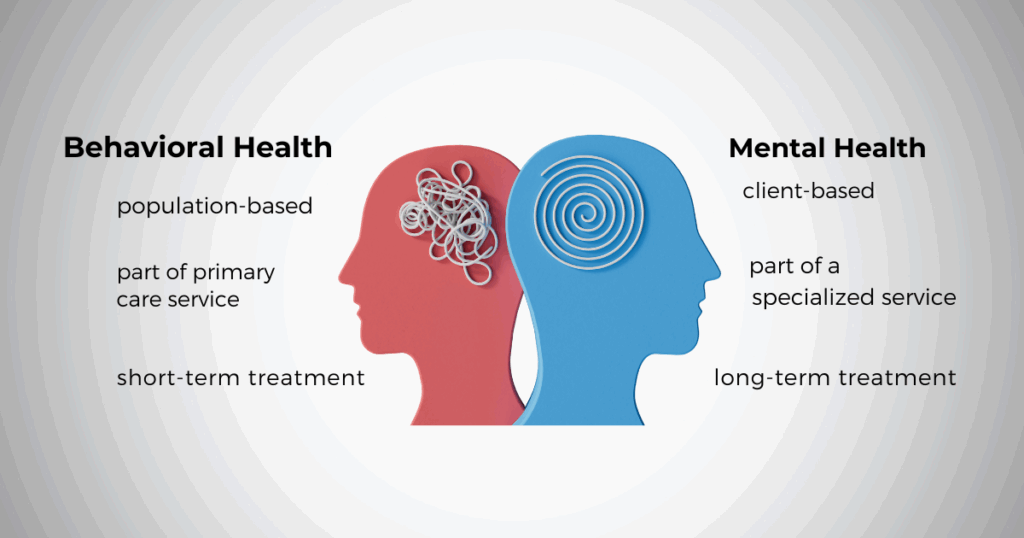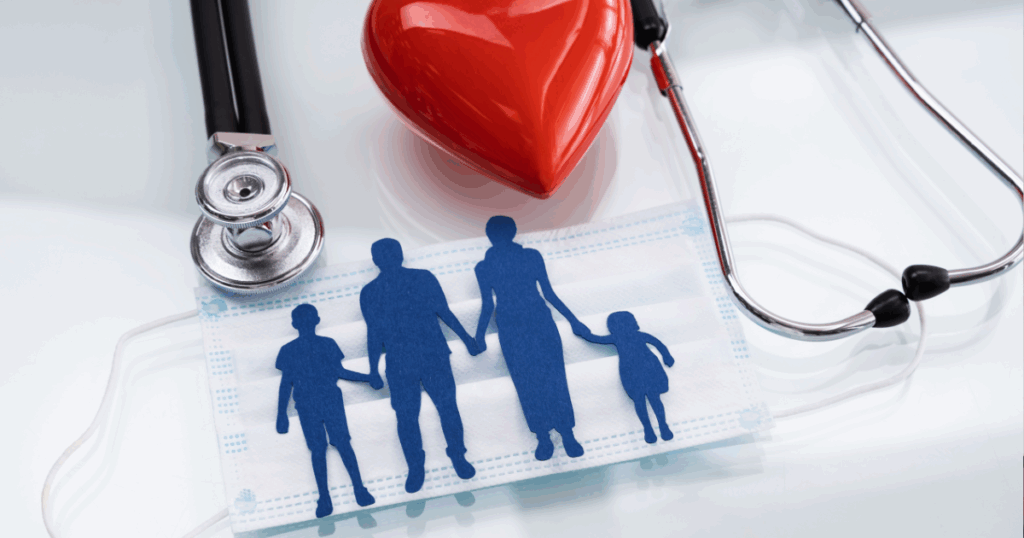One in five adults in the U.S experiences a mental health issue each year. This is not just ‘stress’ or ‘mood swings’ but a deeper issue with your behavioral health. Behavioral health means how our habits and actions impact our overall well-being. It’s about how we feel, react, and how those behaviors affect both our mind and body.
While most people think of health as just diet, exercise, and medical checkups. Psychosocial health defines your emotions and affects your mental and physical health. It’s about the choices you make each day, whether consciously or unconsciously.
It’s so important to spot the signs you need behavioral health support early and to know how to improve behavioral health naturally. The purpose of this guide is to give you a clear understanding of psychosocial health.
What Is Behavioral Health?
According to the behavioral health definition CDC, behavioral health is the connection between your behaviors and your emotional and mental well-being. It’s not just about mental illness. It’s about how your actions, habits, relationships, and emotional responses shape your overall health.
You might hear people use another name such as “emotional wellness”. Different terms, but they all point to the same vital concept
Taking care of how we think, feel, and act.
Components of Behavioral Health
Major components are:
- Mental Health (emotions, thinking patterns, resilience)
- Substance Use and Recovery (managing addiction or substance-related habits)
- Lifestyle Choices (exercise, sleep, diet)
- Social Relationships (family dynamics, friendships, workplace connections)
Why Behavioral Health is Important?
Strong behavioral wellness leads to
- Better relationships, stress management, and productivity.
- Improves physical health by reducing the risk of chronic illnesses.
- Strengthens emotional resilience to handle stress and challenges.
- Supports healthy daily habits like sleep, diet, and exercise.
- Boosts work performance by improving focus and decision-making.
- Prevents substance abuse through healthier coping strategies.
- Detects mental health issues early for quicker recovery.
- Reduces healthcare costs by preventing serious medical conditions.
- Promotes child and adolescent development for long-term success.
- Builds a foundation for lifelong well-being and happiness.
Behavioral Health vs. Mental Health

Many people mix up behavioral vs mental health. They are not exactly the same.
- Mental health focuses purely on emotional, psychological, and social well-being. It deals with conditions like depression, anxiety, PTSD, and bipolar disorder.
- Behavioral health is broader. It covers not only mental illnesses but also health-related behaviors that influence your physical health. For example, smoking, exercising, eating habits, and substance use all fall under behavioral health.
Think of it this way:
- If someone is battling depression, that’s a mental health concern.
- If someone struggles with depression and develops unhealthy eating habits because of it, that becomes a behavioral health issue.
Understanding this difference matters because when it comes to seeking help, you’ll want the right type of support whether it’s behavioral therapy or traditional counseling.
Common Behavioral Health Disorders
- Anxiety disorders (generalized anxiety, panic disorders, phobias)
- Depression and mood disorders
- Substance abuse disorders (alcohol and drug misuse)
- Eating disorders (like anorexia and bulimia)
- Post-Traumatic Stress Disorder (PTSD)
- Attention Deficit Hyperactivity Disorder (ADHD)
Examples of Behavioral Health Conditions
Here are some situations you might recognize:
- A young adult struggling with substance use after a traumatic event
- A teenager dealing with intense social anxiety that affects school performance
- An employee facing burnout, insomnia, and unhealthy eating habits from work stress
- A retiree feeling isolated, leading to depression and alcohol misuse
Each of these scenarios highlights different sides of behavioral health conditions.
Behavioral Health in Children and Adolescents

Children can show signs of behavioral health challenges through:
- Difficulty focusing (ADHD)
- Intense mood swings
- Withdrawal from friends and activities
- Sudden changes in eating or sleeping patterns
According to NIH, about 20% of children between the ages of 2 and 8 have a diagnosed mental or behavioral disorder. Behavioral wellness challenges in adolescents also include substance abuse, self-harm, and anxiety about school or social situations.
Early support through behavioral health counseling can help young people feel more confident handling life’s pressures.
Behavioral Health in Older Adults
A lot of people forget that mental health strategies for older adults are just as crucial. Aging can bring challenges like:
- Loss of loved ones
- Physical health problems
- Social isolation
- Memory issues (like dementia)
All these factors can trigger psychological health conditions such as depression and anxiety. Older adults have one of the highest rates of suicide among all age groups. It’s a sobering reminder of how vital behavioral support is at every life stage.
For older adults, promoting positive behaviors like regular exercise, social engagement, healthy eating, and mental stimulation is critical. And when needed, counseling, therapy, and medical support should be encouraged without shame.
If you’re caring for an elderly loved one, keeping an open line of communication and encouraging professional behavioral therapy when needed can truly improve their quality of life.
Behavioral Health Counseling

Behavioral wellness counseling focuses on helping people cope with challenges like anxiety, depression, trauma, grief, substance use, and major life transitions.
It provides a safe space to:
- Talk openly about struggles
- Identify unhealthy behavior patterns
- Learn practical coping skills
- Set personal goals for healing and growth
Sessions can happen one-on-one, with families, in groups, or even online. Counseling is a vital part of improving both mental and physical health.
Behavioral Therapy
Behavioral therapy takes counseling a step further by focusing directly on changing harmful behavior patterns. This approach is highly structured and goal-oriented. Therapists work with you to:
- Identify triggers for unhealthy behaviors
- Replace negative habits with positive ones
- Reinforce new, healthy behavior through practice
Some common types of behavioral therapy include:
- Cognitive Behavioral Therapy (CBT) for anxiety, depression, and trauma
- Dialectical Behavior Therapy (DBT) for emotional regulation and self-harm prevention
- Applied Behavior Analysis (ABA) often used for autism spectrum disorders
Behavioral therapies are incredibly effective. In fact, CBT alone has been proven to help about 60% of people with anxiety or depression find significant relief.
If you’re struggling with bad habits or emotional swings, therapy offers a structured path toward better mental health.
Behavioral Health in Different Settings
1. Behavioral Health in Primary Care

Doctors are realizing that mental and physical health are deeply connected. That’s why the role of behavioral health in primary care settings is growing fast.
When you visit your regular doctor for a checkup, you might now get asked questions about your mood, stress, or sleep habits. This is not by accident. Studies show that untreated behavioral health conditions, like chronic anxiety or depression, often lead to worse physical health over time.
For example:
- Depression can increase the risk of heart disease.
- Substance abuse can damage the liver, heart, and brain.
Primary care providers work alongside behavioral specialists to catch these issues early. Services might include screenings, referrals, short-term counseling, or even integrated therapy right in the clinic.
2. Behavioral Health in the Workplace

Organizations are starting to understand that when employees feel mentally and emotionally supported, they perform better, stay longer, and get sick less often. Many companies now offer:
- Employee Assistance Programs (EAPs) for free counseling
- Mental health days as part of PTO policies
- Workshops on managing stress and building resilience
- Insurance that covers behavioral health counseling and therapy
If you’re feeling burned out, overwhelmed, or even questioning your career path, it’s not a personal failure. It’s a sign that something needs attention.
Behavioral health job descriptions today often include roles like corporate counselors, wellness coaches, and occupational health psychologists. These professionals work hard behind the scenes to make workplaces healthier for everyone.
3. Behavioral Health Support for Families

Families who seek behavioral health support resources for families often do so because they want to:
- Improve communication
- Heal from trauma
- Manage a family member’s mental health diagnosis
- Strengthen relationships
- Build healthier home environments
If you’re seeing signs that your family dynamic feels unhealthy or tense, you’re not alone.
Taking a brave first step toward getting help can change everything — not just for you, but for your loved ones too.
How to Promote Positive Mind-Body Wellness?
It’s about small, intentional choices made every day. You don’t have to make huge, overwhelming changes to see real results. Simple steps like getting enough sleep, setting boundaries at work, and reaching out when you feel isolated can all help.
Other powerful ways to promote positive behavioral health include:
- Practicing mindfulness or meditation
- Exercising regularly (even a 10-minute walk counts!)
- Spending time with supportive friends and family
- Taking breaks from screens and social media
- Seeking professional support early, not just during a crisis
Final thoughts
Taking care of your behavioral health doesn’t mean waiting until something feels “wrong.” It’s about making small choices every day to live better, feel stronger, and think more clearly.
If you’re struggling right now, please know it’s okay to ask for help. Whether it’s talking to a counselor, trying out behavioral therapy, or simply opening up to someone you trust, every step you take matters. You don’t have to go through anything alone.
Also, don’t underestimate the power of early action. Spotting the signs early, being mindful of your habits, and reaching out can truly change the direction of your life. You deserve a life full of balance, peace, and joy — and working on your behavioral health is a huge step toward that.
Stay kind to yourself. Keep learning. Keep growing. And remember:
Your mental and emotional well-being is just as important as your physical health, always.

Pingback: Prayer for Anxiety: 10 Powerful Islamic Duas for Inner Healing
Pingback: What are the 7 Habits to Avoid Dementia? - Heal With Aneesa
Pingback: How Mental Health Affects Physical Health? - Heal With Aneesa
Pingback: High Functioning Depression: Symptoms, Causes and Cure Guide - Heal With Aneesa